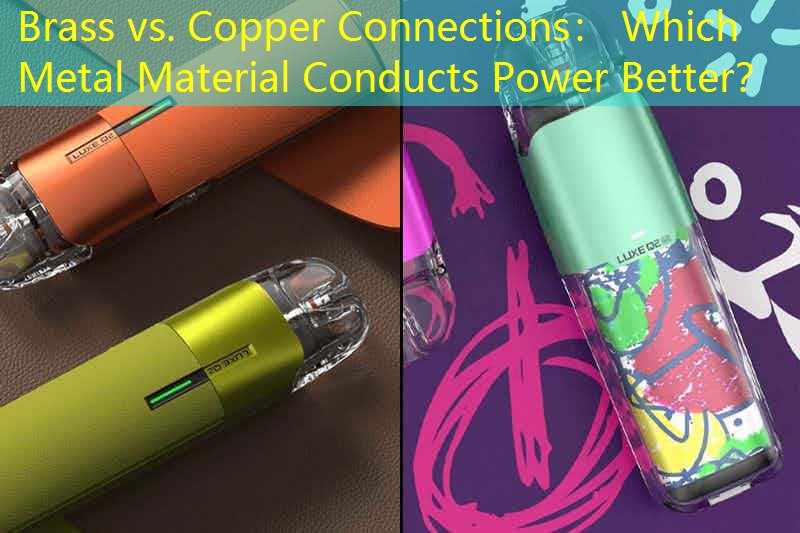Lub hauv paus rau phau ntawv: Understanding the Importance of Conductivity in Metal Connections
In the realm of electronic devices, Kev sib txuas fais fab kev sib txuas ua si ib lub luag haujlwm tseem ceeb hauv kev ua haujlwm tau zoo. Txawm hais tias koj ua qauv luam yeeb hauv hluav taws xob lossis lwm yam khoom siv uas yuav tsum muaj cov hluav taws xob muab, Xaiv cov hlau txoj cai rau kev sib txuas yog qhov tseem ceeb. Tooj dag thiab tooj yog ob qho khoom siv uas siv hauv kev sib txuas hluav taws xob, tab sis ib qho twg yog qhov ua tau zoo dua? Kab lus no ua rau cov ncauj lus piav qhia ntawm tooj dag vs. Tooj Liab Conymts, Kev tshawb nrhiav lawv qhov kev ua haujlwm, yam ruaj khov, thiab haum rau ntau yam kev siv.
Kev sib piv: Tooj dag vs. Copper
One of the primary factors to consider when selecting metal materials for electrical connections is conductivity. Qhov no yog hais txog tus hlau muaj peev xwm xa hluav taws xob hluav taws xob. Raws li ib txwm, copper is known to have superior conductivity compared to brass. Copper boasts an impressive electrical conductivity rating of around 59.6 x 10^6 S/m, making it one of the best conductors available.
Nyob rau hauv sib piv, brass, an alloy primarily made of copper and zinc, typically has a conductivity of about 28 x 10^6 S/m. This reduction is significant, as lower conductivity can lead to energy losses in connections. Yog li ntawd, when high efficiency and low resistance are desired, copper connections are often preferred.

Durability and Corrosion Resistance
While conductivity is essential, the durability of the metal should not be overlooked. In environments where moisture, kev vaum, or other corrosive factors are present, the corrosion resistance of the materials becomes crucial.
Copper, despite its superior conductivity, is susceptible to oxidation over time, which can affect its performance. Ntawm qhov tod tes, brass is known for its excellent resistance to corrosion and is less likely to tarnish when exposed to air.
To illustrate this, consider the following table comparing the properties of brass and copper:
| Property | Copper | Brass |
|---|---|---|
| Electrical Conductivity | 59.6 x 10^6 S/m | 28 x 10^6 S/m |
| Corrosion Resistance | Tswj kav | Siab |
| Tus nqi | Siab dua | Qi dua |
Weight and Size Considerations
When designing compact devices such as electronic cigarettes, weight and size of materials become significant constraints. Copper is denser (8.96 g/cm³) compared to brass (8.4 g/cm³), which might impact the overall weight of the device. For manufacturers aiming for lightweight solutions, utilizing brass can reduce the total weight without significant compromises on strength and durability.

In practical applications, an e-cigarette using brass connections could provide a lighter alternative while maintaining a robust product structure. It becomes essential for designers to balance between conductivity and weight, especially considering portability.
Environmental Impact and Sustainability
Niaj hnub no, many manufacturers and consumers are increasingly aware of environmental impacts when selecting materials. Copper mining and refining can be resource-intensive and often leads to ecological concerns due to its environmental footprint.
Brass, as a recyclable alloy, may present a slightly lower ecological impact during processing. Txawm yog, the entire lifecycle from extraction to disposal needs to be evaluated when deciding on material selection for environmentally conscious products.
Cov Lus Nquag Nug
1. Why is copper often considered the better choice for electrical connections?
Copper is recognized for its exceptional electrical conductivity, which results in higher efficiency in power transmission. This makes it a preferred option for applications where low resistance and optimal current flow are required.
2. Is brass suitable for applications that require high conductivity?
While brass is a durable and corrosion-resistant option, it is not as conductive as copper. Yog li ntawd, it may not be ideal for high-current applications where electrical efficiency is paramount.
3. How does corrosion behavior affect the choice between brass and copper in electronic devices?
Corrosion resistance is vital in maintaining the integrity of electrical connections. Brass generally offers better corrosion resistance than copper, making it more reliable in moisture-prone environments, albeit at the expense of conductivity.







